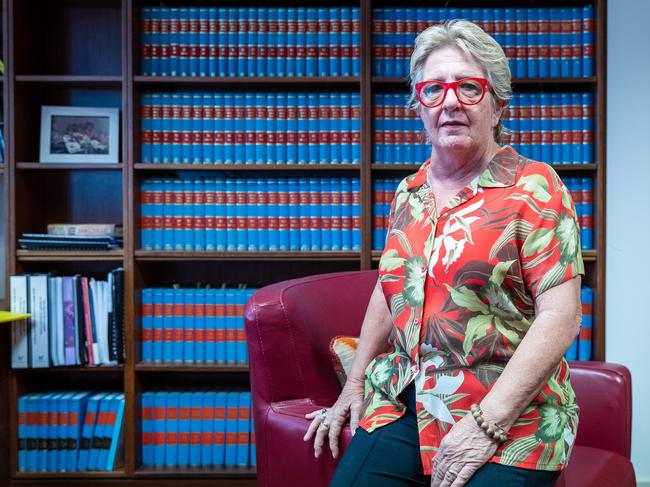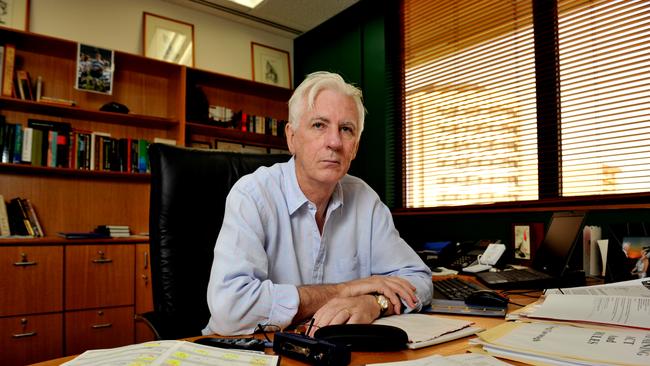‘Epidemic of violence’ plagues women, says NT Supreme Court judge Judith Kelly
Women in the bush are trapped in an epidemic of extreme violence and a culture that protects perpetrators before victims, according to one of the Territory’s most senior judges.
Police & Courts
Don't miss out on the headlines from Police & Courts. Followed categories will be added to My News.
WOMEN in the bush are trapped in an epidemic of extreme violence brought about by intergenerational abuse and disadvantage and a culture that protects perpetrators before victims, according to one of the Northern Territory’s most senior judges.
In an interview with The Weekend Australian, NT Supreme Court judge Judith Kelly said the problems were so severe that in some cases women who had tried to escape had been effectively kidnapped and dragged to tiny outstations to face beatings and rape.
Others had endured years of often drunken, jealous violence inflicted by “hopeless” men, only to be killed in the company of bystanders who did not try to help.
Justice Kelly, one of the Territory’s nine top judicial officers, shared her observations with the Australian after handling scores of such cases since 2009.
Sitting judges rarely give interviews. She broke down during hers. “I just want people to know what’s happening to Aboriginal women,” Justice Kelly said..
“I’m absolutely sure that if people knew, they would care … so if people find out what’s happening, and they do care, maybe something can be done about it.”

Roughly a quarter of the criminal cases before the NT Supreme Court are serious crimes of violence against Aboriginal women. Many more are dealt with by the Local Court.
Aboriginal people represent about one-third of the NT population but the overwhelming majority of its prisoners.
“It is genuinely tragic that there are vast numbers of Aboriginal men in prison,” Justice Kelly told the Australian. “The mirror image of that is the vast numbers of Aboriginal women in the morgue and in the hospitals. It’s a total epidemic of domestic violence.”
She praised the Black Lives Matter movement’s focus on allegations of excessive use of force by authorities, but questioned whether those ought to be the top priority.
Police have fatally shot two Aboriginal men in the NT since 2000: Kumanjayi Walker in Yuendumu in 2019 and another man in Wadeye in 2002.
“In that same period, 52 Aboriginal women have been the victims of homicide, mostly by their partners,” she told the Australian.
“I’m not saying that the two shootings don’t matter. But that level of violence against women, in a non-Aboriginal community in like Sydney or Melbourne, there would be a huge outcry.”
She said claims of racism in the justice system were “very unhelpful” and false.
“It’s not racism that’s doing any of these things; it’s the violence of the men against the women,” she said.
“It’s simplistic, and it trivialises real racism, which is quite a poisonous attitude of mind.”
Justice Kelly argued that Aboriginal women were being made to bear the “absolutely dreadful” brunt of society’s failure to fix problems such as unemployment, passive welfare dependency, substance abuse and intergenerational trauma. Those women were confronted in their communities by culture not just of silence but of actively silencing victims and were usually powerless to help themselves.
“These are not self-destructive women; these are women who can’t escape from a terrible situation,” she said. “These are not people who are complicit in their own victimhood. These people are doing their best to protect themselves, and they can’t.”

Her remarks partly mirror those of then coroner Greg Cavanagh in 2016, who, when handing down his findings into the deaths of two Aboriginal women, called domestic violence “a contagion” that was “literally out of control”.
“The circumstances of these two deaths … reveal the stark reality that the criminal justice system fails to protect women from domestic violence,” he said.
“That is to say, policing and punitive sentences do not provide an answer to stopping the violence.”
Justice Kelly said the typical offender who came before her was a man with a long history of assaulting the same woman and who eventually caused her serious harm, triggering an appearance before a higher court.
“You get young men who are essentially hopeless; they are never going to get a job; they don’t have a chance of status; they lack self-esteem,” she said. “They take it out on women, mostly when they’re ‘jealousing’ and drunk. And it goes on and on and on, and there’s that level of tolerance that allows it to continue.”
Last year, she took the unusual step of allowing cameras into her courtroom to film the sentencing of Samuel Edwards, a violent serial offender who bludgeoned and stabbed his partner to death during a drunken house party in Palmerston in 2019.
Five people were present for part or all of the “prolonged, savage and brutal” attack. Neighbours also heard sounds of distress. None of them called the police.
Justice Kelly told The Weekend Australian the causes of violence against Aboriginal women could not be remedied with a little extra money or a new program. She said there was also a cultural component.
“The evidence is so clear that it can’t really be denied – of a tendency in some communities to prioritise the interests of male offenders over the interests of female victims,” she said. “There is not just a culture of silence; there is an active silencing or attempt to silence Aboriginal complainants, women who have been the victims of violence from men.”
Traditional Aboriginal culture appeared to have some elements of “men having the right to discipline their wives … and a cultural component of revenge”.
“Revenge used to be a lot more formalised, standing for spearing and the like, but now often consists of a carload of men going to somebody’s camp and beating up anybody they can find there,” Justice Kelly said. “And if they happen to kill somebody during that process, then there’s a blood feud.”
Offenders often did not believe they had erred, even after sentencing. Justice Kelly mentioned one who claimed “men can hit wives” and whitefellas had “no right to change that”. She also recounted a remark by a woman who broke her niece’s leg.
“She said, ‘I haven’t done anything wrong; I asked her for beer, and she didn’t give it to me, and she’s been cheeky before’,” she said.
Justice Kelly said some men thought they had “ownership of a woman – she has no right to say no, and she has no right to leave when she wants to”.
Crown facts in many domestic and family violence cases say the crime was reported by a nurse or a doctor when the victim sought medical attention. Justice Kelly took that as evidence the Territory’s already appalling official violence rates are underestimated.
NT Chief Minister Natasha Fyles told The Australian that the elevation of a federal Labor government and three Indigenous federal NT representatives presented a “historic” opportunity to tackle domestic and family violence. But she did not outline any new strategy besides using needs-based funding to deliver services locally.
Justice Kelly said bringing down violence rates would require tackling the causes of crime, such as disadvantage, which were society’s problems.
“The cultural component of the tolerance for violence and the prioritising of the rights or the interests of men and male offenders over those of women and women victims, that’s not something that can be dealt with by wider society; that has to come from within,” she said.
She did not believe the parole system was failing but did think correctional services, the Director of Public Prosecutions and legal aid agencies were under-resourced.




